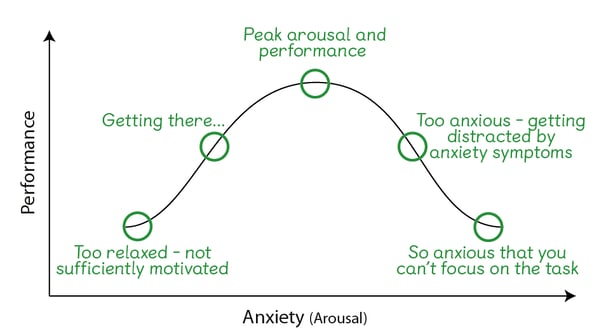Anxiety
Read more about common symptoms, statistics, and treatment for anxiety.
Sabreelyn Villalpando
What is Anxiety?
Being anxious is a normal part of life. If you have a job interview coming up, it is normal to be nervous. However, this does not mean you have an anxiety disorder.
Anxiety disorders feature prolonged feelings of intense worry or fear that can get worse over time. These feelings become so consuming and intense that they interfere with everyday life activities like school or job performance. As shown in the graphic below, one’s performance is affected by their levels of anxiety. Too much or too little anxiety can negatively affect performance.
There are many types of anxiety disorders such as generalized anxiety disorder (GAD), panic disorder, and social anxiety disorder.
Symptoms of Anxiety
Anxiety can look different for everyone. Here are some common symptoms of anxiety disorders:
Feeling on-edge, restless
Difficulty concentrating
Difficulty controlling feelings of worry
Trouble sleeping, falling or staying asleep
Sweating
Tight muscles
Headaches
Stomachaches
Increased heart rate
Statistics
Anxiety disorders are one of the most common mental health illnesses in the United States affecting over 40 million people. (NIMH)
Women are twice as likely to have anxiety as men. (NIMH)
Anxiety disorders are treatable! However, only 36.9% of people receive treatment. (ADAA, 2022)
Treatment
There are many options for the treatment of anxiety. Psychotherapy, medication, mindfulness, support groups, and life changes are a few different ways to treat an anxiety disorder. In the end, anxiety disorders can lead to more issues if left untreated, but you should work with your health care provider to decide the best treatment for you.
Conclusion
In the end, millions of Americans of every demographic have experience with anxiety. If you or someone you know might be struggling with anxiety, feel free to contact us about starting counseling.
If this is an emergency, please dial 911 or contact your local hospital.
References
U.S. Department of Health and Human Services. (n.d.). Anxiety Disorders. National Institute of Mental Health. https://www.nimh.nih.gov/health/topics/anxiety-disorders
Anxiety & Depression Association of America. (2022). Anxiety Disorders - Facts & Statistics. https://adaa.org/understanding-anxiety/facts-statistics
Written by Sabreelyn Villalpando

